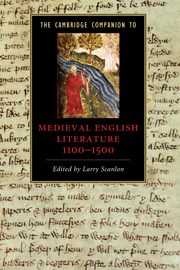Book contents
- Frontmatter
- Introduction
- Part I Contexts, genres, and traditions
- 1 Re-inventing the vernacular: Middle English language and its literature
- 2 Textual production and textual communities
- 3 Religious writing: hagiography, pastoralia, devotional and contemplative works
- 4 Romance
- 5 Dialogue, debate, and dream vision
- 6 Drama
- 7 Lyric
- 8 Lollard writings
- Part II Authors
- Guide to further reading
- Index
4 - Romance
from Part I - Contexts, genres, and traditions
Published online by Cambridge University Press: 28 November 2009
- Frontmatter
- Introduction
- Part I Contexts, genres, and traditions
- 1 Re-inventing the vernacular: Middle English language and its literature
- 2 Textual production and textual communities
- 3 Religious writing: hagiography, pastoralia, devotional and contemplative works
- 4 Romance
- 5 Dialogue, debate, and dream vision
- 6 Drama
- 7 Lyric
- 8 Lollard writings
- Part II Authors
- Guide to further reading
- Index
Summary
Romance was the dominant non-devotional genre of Middle English literature, and its themes permeate medieval literary culture at large. However, because the genre was so ubiquitous and various, it is difficult to define. Romance is the carnival magician of genres, conjuring variety from the same bag of tricks: stock characters, repeated plots, motifs, memes, and overriding themes, right down to the level of verbal formulas and conventional phrases. Individual romances often follow a typical narrative trajectory: exile leading to return, loss redeemed by restoration, complacency goaded by instructive ordeal, innocence riven by experience, the construction of careers and the fall of kingdoms. Its gestures and motifs are equally identifiable - the knight errant, the beautiful endangered lady, the lost heir, the trial of prowess or virtue, the pact gone wrong, the monstrous, magical, and/or disguised challenger, the journey to the otherworld, the joyous return of the prodigal, and the reintegrative celebration.
At the same time, however, the genre is extremely flexible. Its repertoire alters over time as romance writers discard, patch, and adapt their conventional materials so that they can speak more intimately to the on-the-spot concerns of their audiences. Helen Cooper suggests that romance is best conceived as a family, branching and evolving in different directions, rather than as manifestations or “clones of a single Platonic idea,” and this family metaphor is useful because it stresses the genre's existence in time. Its mythic, estranged, “once-upon-a-time” mode of telling can actually provide ways of coming to grips with difficult cultural problems - monarchical acquisitiveness, legal corruption, the insecurities of representation and display, commercialism, aristocratic feud - from safer or more elucidating distances. Its exploration of loss and recuperation can speak intimately to the anxieties of its audiences; its fantasies can express yearnings that are profoundly and traceably historical. The genre serves audiences who need simultaneously to be reassured by the traditional and gripped by the urgent and imminent.
- Type
- Chapter
- Information
- Publisher: Cambridge University PressPrint publication year: 2009
- 2
- Cited by



